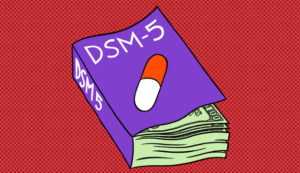In a new article for the journal Social Science & Medicine, sociologist Owen Whooley investigates how the DSM-5 creators failed in their attempt to create a valid diagnostic system.

“In the DSM-5 case, conceptual and technical challenges involved in the creation of metrics for commensuration – notably discussions over diagnostic validity and clinical utility – were inflected with professional and political concerns that undermined the process,” Whooley writes. “Thus, this case highlights how the task of creating metrics involves judgments made under conditions of uncertainty, conflict and compromise among diverse actors, and negotiations of extra-scientific, non-empirical issues, which then are written into the metrics themselves.”
Initially framed as a “paradigm shift” by the American Psychiatric Association (APA), the latest version of the diagnostic manual was meant from its inception to move away from a categorical understanding of mental illness and toward a dimensional approach. As the DSM-5 revision progressed, however, the creation of new severity scales became a major source of controversy, and the endeavor to secure diagnostic validity was eventually abandoned.
Whooley, a professor of Sociology at the University of New Mexico who specializes in the sociology of medicine and mental health, calls the DSM-5 an example of “failed commensuration.” He defines commensuration as “a process by which different entities are transformed via a common metric so that they may be quantitatively compared and ranked.” In this instance, Whooley suggests that the DSM task force initially pushed for a new diagnostic metric in an attempt to “shore up the bona fides of psychiatry” and “trade on the association of measurement with science, rationality, and objectivity…”
Through in-depth interviews with 30 people who participated in the DSM-5 revision, Whooley examines the attempt to create these new severity scales from start to finish and documents how the decision was ultimately made to exclude all but a couple of scales from the manual.

The previous schema inherent in earlier versions of the DSM assumed a categorical approach to ‘mental illnesses’ as discrete conditions. The categorical approach had received (and still does receive) a great deal of criticism from both observers and psychiatric researchers. As the DSM-III had achieved higher reliability scores, meaning there was more agreement over the categories between clinicians, Whooley, and many others, have noted: “Better reliability had not secured more valid diagnostic categories, useful biomarkers for mental illness, or an understanding of the mechanisms of mental disorders.”
The “paradigm shift” was meant to re-conceptualize mental disorders as “divergences on continua between normality and pathology,” with patients being assessed along a spectrum. Though, Whooley points out that the assumed link between this new “dimensionality” and validity was tenuous at best and based on speculative research.
Validity would entail a diagnostic concept that directly references “reality” or “nature” and points to a pathological process or disease entity in the body, but “a causal mechanism of mental disorders upon which validity depends is absent.” Validity in diagnosis would be much harder to accomplish than reliability, as reliability requires only expert consensus. For validity, Whooley writes, “its referent is underlying reality, not communal norms.”
Another major issue with the severity scales, according to the interviews, was the failure to convince clinical practitioners. Researchers and practicing psychiatrists clashed over the issue of ‘clinical utility.’ Dimensionality was seen as a poor fit for clinical practice and many professionals argued that it is “a clinical convenience to have categories.”
Ultimately, Whooley writes, “the DSM-5 commensuration project failed because it did not reconcile the needs of clinicians and researchers.”
****
Whooley, O., 2016. Measuring mental disorders: The failed commensuration project of DSM-5. Social Science & Medicine, 166, pp.33-40. (Abstract)















MIA Editors: You need to credit the artist responsible for the editorial illustration you used to accompany this article.
Liz Sydney
Report comment
“‘For validity,’ Whooley writes, ‘its referent is underlying reality, not communal norms.'”
I think this is a pivotal statement. While “underlying reality” may, in and of itself, be a controversial and debatable item, it is definitely true that the DSM is based on “communal norms,” which, as most of us have come to realize, is no measure of health and well-being, as per Krishnamurti. In fact, we know with certainty that establishing a social standard as per these “communal norms” is dangerously and unnaturally rigid, and unrealistic beyond measure.
To my mind, this is exactly what causes such chronic stress, to feel that one has to live up to these bogus standards feeling one has to live up to this to be considered “healthy” or “acceptable” to society. In reality, I truly believe no one does live up to DSM standards, it is impossible, non-human. It’s just that some know how to skillfully project that they do, while, in essence, hiding their authentic self, extremely repressed.
And when one admits and demonstrates freely that he/she neither “fits in,” nor cares to, here comes the stigma, marginalization, and eventually, second-class citizenship, all for either not fitting into the sick society (so society makes itself even sicker via othering), or for having problems and asking for help. The DSM is a dictionary of stigma..
From my film, Voices That Heal, “Stigma is born in the mindset of fear and discrimination and occurs when social norms are challenged.” Sounds like the DSM to me.
Report comment
Btw, when social/community norms are challenged to the extent they are being challenged at present, due to all the blatant inequality and the harm done and suffering imposed onto innocent people as a result, that means it is time to evolve! So how would that be possible if everyone who challenges the norm, in any respect, gets labeled, drugged, shocked, and basically discarded from society, especially if they dare to speak their truth about the matter? No growth there, no evolution, just a stuck society, rife with corruption, abuse, and all sorts of violence. That is a bleak picture.
That’s what the DSM does, it invalidates anyone who challenges this sick society (which it so badly needs to be challenged, it is more than reasonable at this point), so the pressure builds. Doesn’t seem very useful to me at all, if we want to heal, grow, and evolve forward. Can’t stop the truth, though, and we definitely cannot stop change and growth from happening, so I’m extremely curious how this will go down.
Report comment
“… when one admits and demonstrates freely that he/she neither ‘fits in,’ nor cares to, here comes the stigma, marginalization, and eventually, second-class citizenship, all for … not fitting into the sick society….” I agree, Alex, this is the problem. I was listening to a talk on consciousness the other day which was really interesting.
One point the speaker made was society can be ruled with love or with fear, and our current society is being ruled with fear, and this will inevitably lead only to chaos. And the psychiatrists job is to drug up all those who want to live in a society of mutual respect, cooperation, and love. As opposed to our current short run profit worshipping, crony capitalist, fear and war mongering society. “That’s what the DSM does, it invalidates anyone who challenges this sick society.” I agree, the status quo is sick, and needs to be challenged. There is a better way.
Report comment
Nice to see this information. He says on his site that he’s writing a book about the history of psychiatry. It could be good if he’s already saying that psychiatry’s own central reference is invalid, and that it’s a product of inter-professional delusion.
Liz Sydney
Report comment
Pity we can’t get the same criticism of the ICDs.
Just as useless and an excuse not to investigate the patient thoroughly.
Report comment